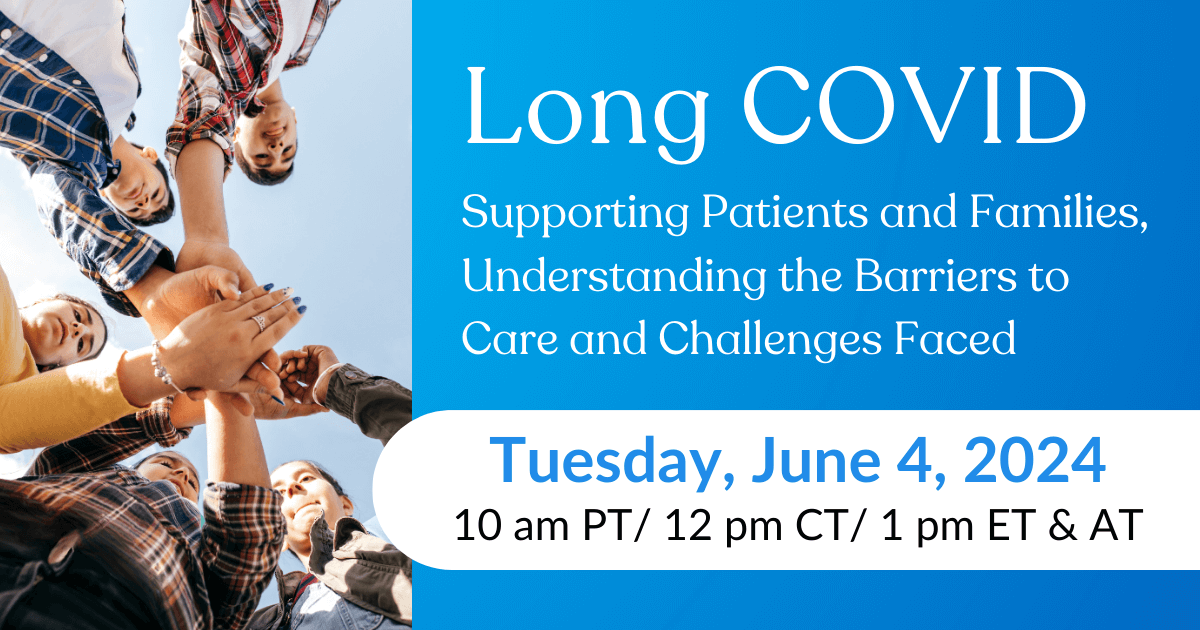
* This webinar will be provided in English with simultaneous interpretation into Spanish *
The impact of long COVID on patients goes beyond physical symptoms. Long COVID impacts have been shown to affect patients, their families, and caregivers psychologically and relationally. In this webinar, clinicians serving immigrants, migrants, and patients from other under-resourced communities will learn the varied challenges patients and their families may face before, during, and after a long COVID diagnosis. Acknowledging the barriers to specific long Covid care that patients and families face helps them feel seen and heard. The webinar will also address the kinds of advocacy and policies needed to improve long COVID care now and in the future.
Watch the Webinar Recording
Download the Presentation Slides
Take the Evaluation
At the conclusion of this presentation, participants will be able to…
- Identify challenges patients, families, and caregivers face before, during, and after a long COVID diagnosis.
- Explain the psycho-social experience patients, families, and caregivers have when someone is suffering with long COVID.
- Identify ways clinicians can improve the experience of patients and families when they are coping with someone who is ill with long COVID.
Presenters

Kaethe
Weingarten
Ph.D.
Migrant Clinicians Network
Kaethe Weingarten, Ph.D. (she/her) is the founder the Witness to Witness (W2W) Program. The goal of W2W is to help the helpers, primarily serving health care workers, attorneys and journalists working with vulnerable populations. She received her doctorate from Harvard University in 1974. She has taught at Wellesley College (1975-1979), Harvard Medical School (1981-2017), where she was an Associate Clinical Professor of Psychology in the Department of Psychiatry at Children’s Hospital Boston and then Cambridge Health Alliance, and at the Family Institute of Cambridge (1982-2009). She founded and directed the Program in Families, Trauma and Resilience at the Family Institute of Cambridge. Internationally, she has taught in Africa, Australia, Canada, Europe and New Zealand, where she was a Fullbright Specialist. She has given over 300 presentations and been a keynote speaker at numerous local, national and international conferences. She serves on the editorial boards of five journals. In 2002 she was awarded the highest honor of the American Family Therapy Academy, the award for Distinguished Contribution to Family Theory and Practice. She has written about her work in six books (which she has authored or edited) and over 100 articles, chapters and essays. Her most recent book, Common Shock: Witnessing Violence Every Day- How We Are Harmed, How We Can Heal won the 2004 Nautilus Award for Social Change. Dr. Weingarten’s work focuses on the development and dissemination of a witnessing model. One prong of the work is about the effects of witnessing violence and trauma in the context of domestic, inter-ethnic, racial, political and other forms of conflict. The other prong of the witnessing work is in the context of healthcare, illness and disability. Her work on reasonable hope has been widely cited. In 2013, Dr. Weingarten and her husband moved to Berkeley, CA to be near their children and five grandchildren. There she resumed a dance and choreography practice she had let lapse for forty-five years. Since moving to Berkeley, she and her dance collaborator have been awarded five grants for their choreography with elder dancers applying a witnessing model in public spaces. In 2018 they performed at the Oakland Museum of California. In her spare time she enjoys hiking, baking and crocheting afghans.
Continuing Education Credit (CEU)

Application for CME credit has been filed with the American Academy of Family Physicians. Determination of credit is pending.

Migrant Clinicians Network is accredited as a provider of nursing continuing professional development by the American Nurses Credentialing Center's Commission on Accreditation.